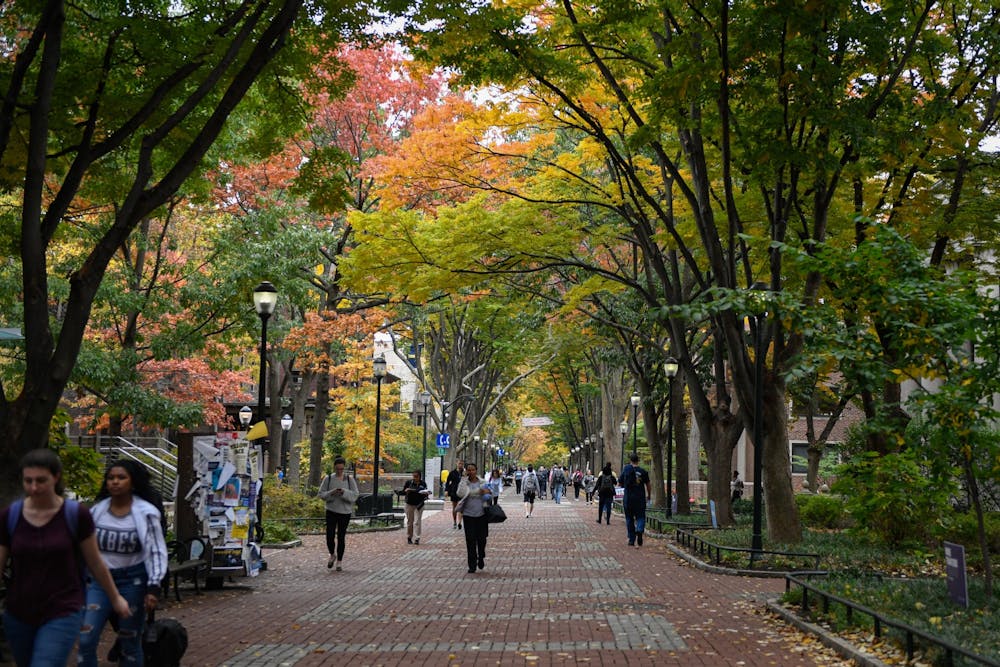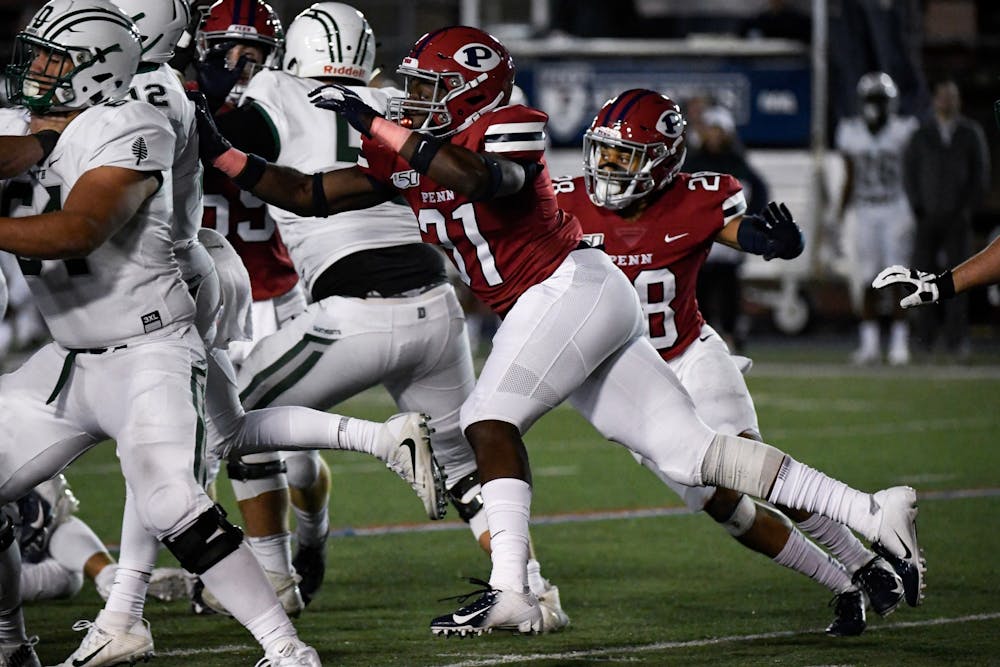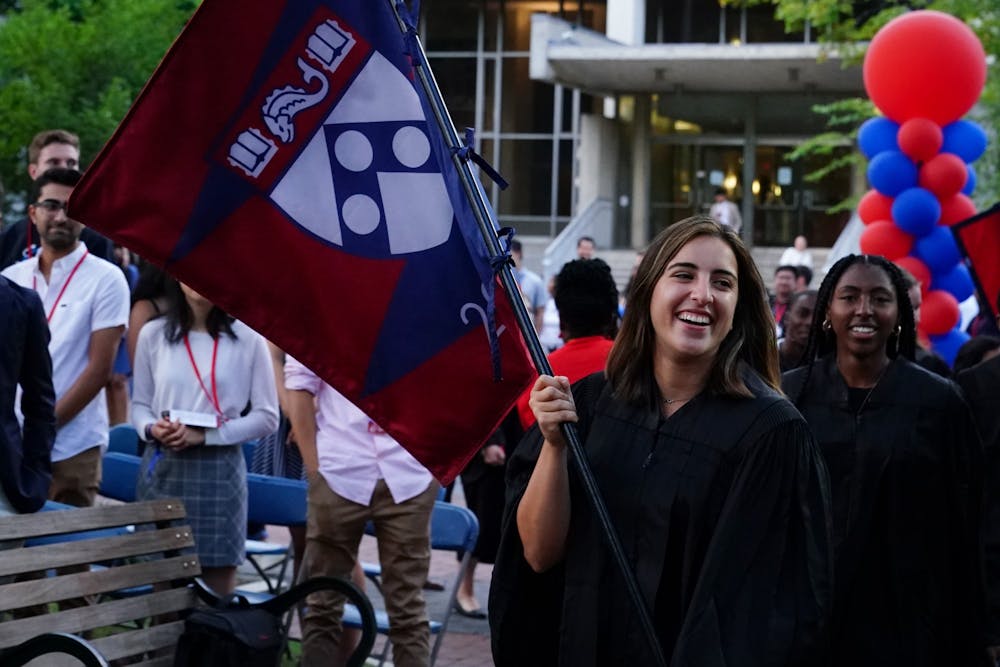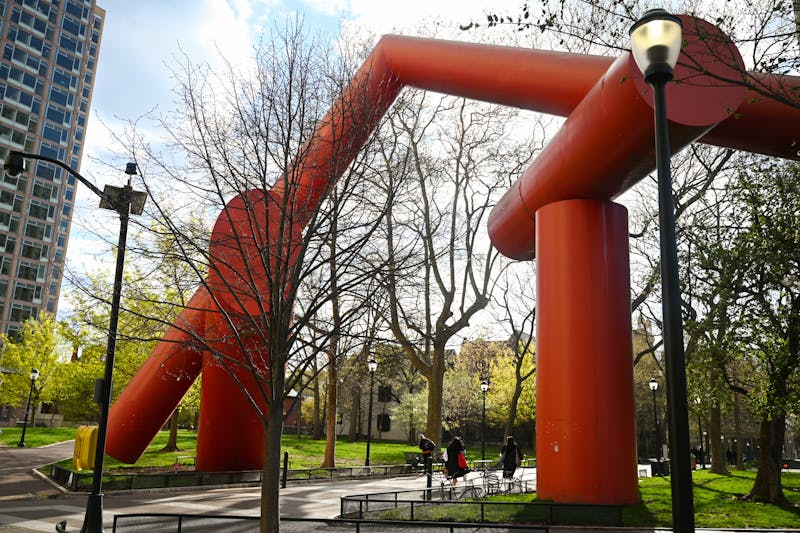
The Class of 2021's final year at Penn will begin with a hybrid mode of instruction.
Credit: Chase SuttonA college career defined by in-person experiences and a bustling campus was quickly halted by a global pandemic this spring — an obstacle that rising seniors never envisioned would mark the end of their time at Penn. As the final year for the Class of 2021 quickly approaches, they acknowledge that it will look vastly different from what they ever imagined it to be like.
While many rising seniors members of the Class of 2021 are disheartened by the University’s decision to conduct the fall semester in a hybrid format, they are unsurprised by the announcement, as they have come to terms with the fact that the COVID-19 pandemic will be a part of their final year.
Rising Nursing senior Sydney Steward said "there is no perfect option" for the fall semester, and while the hybrid model is not the typical Penn experience, she believes that students should still be thankful that there is an option to return to campus.
Rising Engineering senior Mary Chao and rising Wharton senior Jake Milner both agreed with Steward, saying the University made a smart decision to administer the vast majority of classes online.
Though many accept that Penn’s plan is the best option, some members of the Class of 2021 said they are worried about campus social life and continuing online education.
Both Steward and rising Wharton senior Benji Mowatt, who is also a defensive lineman Penn's football team, said they were hoping to use senior year to catch up on social experiences they had previously missed in the spring due to busy academic and extracurricular schedules.
On July 8, The Ivy League announced the cancelation of all competitive sports until January 1 with no indication from the league on whether or not canceled fall sports, including football, will resume in the spring.
Mowatt said that he joined the Kinoki Senior Society at the start of the spring 2020 semester as part of his push to make new friends outside of his football teammates, but now he will miss out on the in-person events that would take place in a normal senior year.

Rising Wharton senior Benji Mowatt attempts to make a tackle during a football game against Dartmouth.
Some rising seniors believe it will be imperative for their class to adapt to a modified social life at Penn in the future. Rising Wharton senior and Class Board 2021 president Lizzie Youshaei said student leaders are faced with a “once-in-a-centennial position” as they are now forced to come up with creative ways to keep extracurricular activities alive.
Milner, who serves as the president of Penn Glee Club, and Youshaei, who is the president of Penn Shabbatones, said they hope their respective performing arts groups will be allowed to hold in-person rehearsals to prepare for the possibility of live-streamed performances. Performing arts groups have yet to receive information from the Performing Arts Council and the Platt Performing Arts House regarding how they can operate in the fall.
Rising College and Engineering senior Natalia Acero said virtual learning in the spring lacked the same quality as her in-person courses in previous semesters. She said that her upcoming classes would be more difficult even under normal circumstances, and believes a mostly online instruction format will not make the difficult project any easier.
“Online classes were not a complete click for me. I feel more comfortable in in-person classes,” Acero said. “Senior year classes are important, and I’m concerned about how online learning is going to translate.”
For many students, senior year is also a time to complete theses, independent studies, and other senior-specific projects.
Engineering students are required to develop a senior design project, which is created in small groups and takes the entire year to complete, and Chao said she believes it will be even harder to collaborate with others virtually.
Rising College senior Michiyah Collins planned to complete an independent study to fulfill one of her final biology major requirements. Collins is nervous about if she will be able to complete it, since it is now unclear if the program will be held as planned.
Penn will conduct the fall semester through a hybrid format, allowing courses with less than 25 students to be administered in person — but final decisions will be based on the professor’s discretion, department policies, and the availability of adequate classroom space. Some professors have said that they are wary of risking their health to teach in-person courses.
In addition to concerns about social life and academics, Youshaei said Penn should lower the cost of tuition for the upcoming academic year to accurately reflect the diminished experience that she and other seniors will receive in their final year.

Class Board 2021 president Lizzie Youshaei at Convocation in 2019.
“I think it’s wrong to tell students you’re getting as good of an experience virtually,” Youshaei said. “Students are frustrated that they are not getting the same extracurricular and academic experience that they wanted. The University needs to do more in terms of being honest with our experience this year.”
There is an ongoing nationwide debate on the price of college tuition for the upcoming academic year, as many universities across the United States are choosing to adopt instruction models primarily or entirely based on remote learning. Princeton University is the lone Ivy League institution to approve a tuition cost reduction, approving a 10 percent discount for all students. Penn is continuing with a 3.9% increase in total cost of attendance for the upcoming year.
The upcoming semester presents an additional set of challenges for first generation, low income students — many of whom rely on the University for housing, food, and internet access during the school year.
Collins, who is a FGLI student and is on the FGLI Dean’s Advisory Board, said she is particularly concerned about how FGLI students will access resources during the period between Nov. 20, when students will be required to move out of on-campus housing, and the start of the spring semester, which is currently scheduled to begin on Jan. 13.
After students leave for Thanksgiving Break, the remainder of fall semester courses, including final exams, will be conducted completely online. Collins said she is concerned that some students who are forced to move home after Thanksgiving Break, as well as students who choose not to return to campus during the fall, will have inadequate access to the internet and other resources that may inhibit them from sufficiently fulfilling academic obligations.
But, despite these concerns, Collins looks forward to receiving her diploma in May.
“I finally will have a college degree and be the first in my family to have a college degree. So, no matter what is happening, nothing will take that happiness away from me.”
Rising College and Wharton senior Victoria Mayer, who is from Austria, and Rising College senior Natalia Acero, from Colombia, planned to return to campus in the fall, but were both anxious when they heard of the July 6 U.S. Immigration and Customs Enforcement mandate barring international students from entering or staying in the country if taking solely online courses for the fall 2020 semester. Acero said she was shocked by the policy since it is up to the professors' discretion if classes will be held in-person, and said it was “very disrespectful and unfair" the order was put in place at all.
The federal mandate has since been rescinded shortly after states and universities across the country, including Penn, filed legal challenges against ICE and the Department of Homeland Security for the order.
As COVID-19 cases continue to rise across the U.S., some rising seniors fear that the pandemic poses a significant threat to the status of the spring semester, specifically the culmination of their four years of hard work: commencement.
Mowatt said he is worried that the Class of 2021 commencement will be postponed due to the pandemic, similar to the delayed in-person commencement for the Class of 2020. Upon thinking about the possibility of an online commencement, Steward said she had an "empty feeling."
Though Locust Walk will not be as vivacious as it may have been in a non-pandemic world, Chao said she is hopeful that seniors will be able to appreciate the alternative version of their final year at Penn.
“I'm excited to figure out whatever the new normal is going to be,” Chao said. “I know it's probably going to be suboptimal compared to what it would have been. But we'll still reach some sort of normal. Penn students will always find some way to have fun and make the most of whatever we have.”
The Daily Pennsylvanian is an independent, student-run newspaper. Please consider making a donation to support the coverage that shapes the University. Your generosity ensures a future of strong journalism at Penn.
Donate







